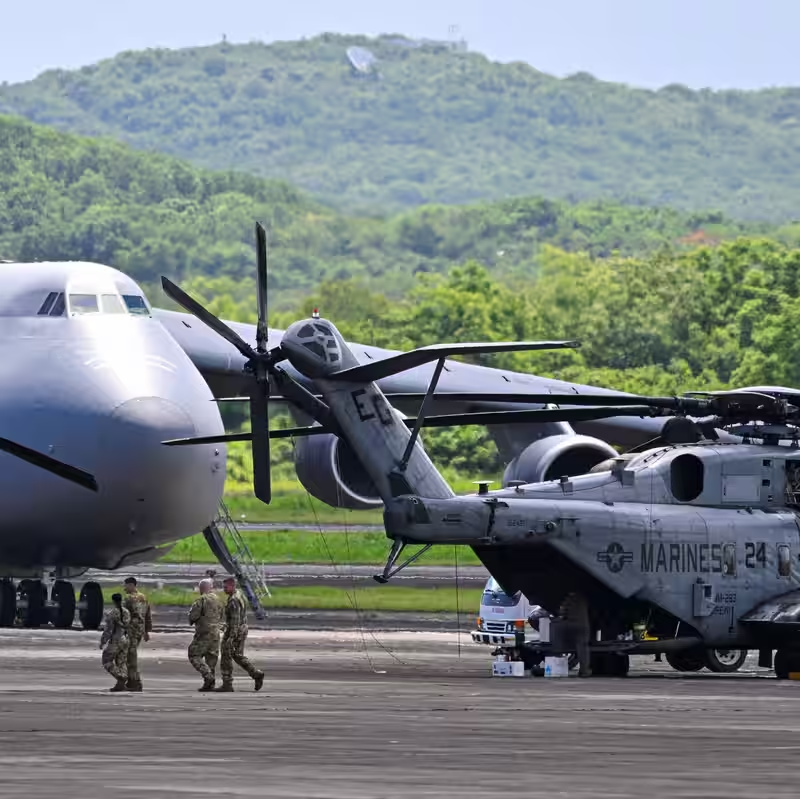Table of Contents
- Ecuador Releases U.S. Strike Survivor
- The Caribbean Strike and Its Aftermath
- Trump’s ‘Terrorist’ Designation Controversy
- Legal Questions Over Military Drug War
- What Happens to the Other Survivor?
- Sources
Ecuador Releases U.S. Strike Survivor
In a direct rebuke to the Trump administration, Ecuadorian prosecutors have declined to charge and have already released Andrés Fernando Tufiño—the sole Ecuadorean survivor of a U.S. military strike on a semi-submersible vessel in the Caribbean last week.
President Donald Trump had publicly declared that Tufiño would face “detention and prosecution” after being repatriated. But Ecuador’s legal system had other plans. According to a government official who spoke on condition of anonymity, prosecutors determined Tufiño had not committed any crime on Ecuadorean soil and therefore could not be prosecuted.
The move marks a rare instance of a Latin American nation openly defying U.S. pressure in the escalating “military drug war” launched by the Trump administration.
The Caribbean Strike and Its Aftermath
The incident occurred on October 17, 2025, when a U.S. Navy vessel targeted a suspected drug-smuggling submersible in international waters. The strike killed two people and left two others—Tufiño of Ecuador and Jeison Obando Pérez of Colombia—struggling in the water before being rescued.
Both survivors were held aboard a U.S. warship while Washington decided their fate. Rather than bring them to the U.S. or detain them at Guantánamo Bay, the administration chose to repatriate them—a decision that quickly unraveled as Ecuador refused to comply with Trump’s demands.
Trump’s ‘Terrorist’ Designation Controversy
The strike is part of a broader policy shift under President Trump, who has labeled South American drug cartels as “terrorist organizations” and authorized the military—not law enforcement—to use lethal force against suspected smugglers.
“These are not criminals—they are terrorists who pose an imminent threat,” Trump said in a Saturday address. But legal experts and human rights advocates have strongly contested this framing.
“Drug cartels are profit-driven, not ideologically motivated,” said Dr. Elena Ruiz, a professor of international law at Georgetown University. “Calling them terrorists doesn’t magically make military killings legal under the laws of war.”
Legal Questions Over Military Drug War
Traditionally, maritime drug interdiction has been handled by the U.S. Coast Guard in coordination with regional partners—a law enforcement model that emphasizes capture, due process, and prosecution.
But the Trump administration’s new doctrine treats suspected smugglers as enemy combatants, allowing for summary execution without trial. This approach has alarmed legal scholars, including retired military judge advocates, who argue it violates the Geneva Conventions and U.S. constitutional principles.
U.S. Military Strikes on Drug Vessels (2025)
| Date | Location | Reported Fatalities | Status |
|---|---|---|---|
| Sep 2, 2025 | Caribbean Sea | 5 | First strike under new policy |
| Oct 17, 2025 | Caribbean Sea | 2 | Two survivors rescued |
| Total (as of Oct 21) | Multiple | 32 | 7 strikes announced |
Adding to the controversy: most U.S. overdose deaths are tied to fentanyl from Mexico, not cocaine from South America—raising questions about the strategic logic behind targeting Caribbean submersibles.
What Happens to the Other Survivor?
While Tufiño walks free in Ecuador, the other survivor, 34-year-old Jeison Obando Pérez of Colombia, remains in critical condition. Hospitalized with severe brain trauma, he is on a ventilator and has not yet regained consciousness.
Colombian Interior Minister Armando Benedetti confirmed that once Obando recovers, he will be “processed by the justice system for drug trafficking”—a stark contrast to Ecuador’s hands-off approach.
Meanwhile, U.S. lawmakers are demanding answers. Representative Adam Smith, the top Democrat on the House Armed Services Committee, has called for hearings to examine the legality and transparency of the strikes.
“The administration has failed to demonstrate the legality of these strikes,” Smith said. “We have yet to see any evidence that these vessels posed an imminent threat justifying military force.”
For now, Ecuador’s quiet release of Tufiño stands as a symbolic challenge to America’s expanding military reach—and a reminder that sovereignty still matters in the Western Hemisphere.




